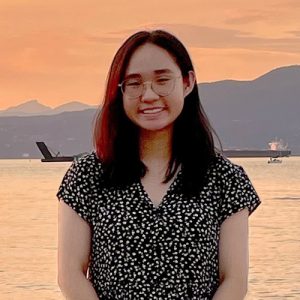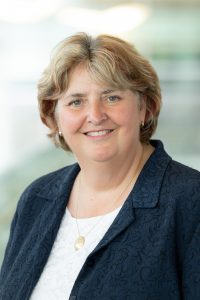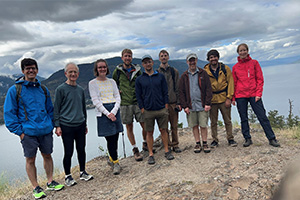New alumna and former undergraduate research ambassador Yuen Yee Leung dives into her lifelong curiosity for science

The young girl peered closely at a small green leaf in her hand—her scientific curiosity growing and blossoming like the plant. Little did she know that one day, she would travel across the world to satisfy that curiosity.
New Irving K. Barber Faculty of Science alumna and former undergraduate research ambassador Yuen Yee Leung developed an interest in science at an early age growing up in Ho Chi Minh City, Vietnam and Hong Kong. From dissecting plant leaves to building volcanoes as a child, Leung has always been curious about the world around her.
“Throughout school, I took science classes whenever I could,” Leung shares. “Biology was my main interest, but I also enjoyed chemistry and physics.”
Encouraged by her secondary school biology teacher, Leung served as the Biology Subject Ambassador in her program. “That was the beginning of my interest in helping other students,” she explains. “It was also my first experience having a mentor and someone outside my family really support me.”
Attending an international high school also encouraged her to think globally when planning her future. “I applied to universities across the globe, but what drew me to UBC Okanagan was the connected environment where I could grow as a person in a close-knit, nurturing community.”
Though she initially chose to major in Psychology, the trajectory of Leung’s education was forever changed after an Introduction to Microbiology course reignited her passion for biology, leading Leung to switch majors and pursue the Microbiology Honours program. Through her undergraduate courses, she gradually developed a deeper interest in biomedical science research.
In her second year, Leung participated in the Undergraduate Research Awards, completing a research project focusing on the oxidation of camptothecin backbone through the use of oxidative enzymes. This research earned her an International Undergraduate Research Award and inspired a deep love of research—which she continued to nurture in her Microbiology honours research focusing on working with plants that produce high-value chemicals. “Research drives me to go above and beyond and truly understand the practical applications of what I’m studying,” shared the recent alumna. “I also like the collaborative nature of research — you don’t just do research by yourself—you bounce ideas off your colleagues and talk to your supervisor about your ideas and hypotheses. Research encourages students to dive into their curiosities and take action.”
Her experience with the Undergraduate Research Awards led her to apply for the role of Undergraduate Research Ambassador. “It’s a service I would have loved when I started undergraduate research,” she says. “As a first-generation university student, I completely understand how daunting navigating life during university can be, so having support from university resources, friends, and colleagues is extremely important.”
UBC Okanagan’s Undergraduate Research Ambassadors assist undergraduate students to get involved in the many research opportunities available at the university. Despite participating in the program during a year that saw COVID-19 measures implemented across campus, Leung is proud of the work their team was able to accomplish and sees exciting opportunities for the program to continue developing and supporting student research in new ways. “Through my interactions with the students, I’ve seen that there is a lot of interest, but students don’t know where to start. Although COVID-19 made things more difficult, we were still able to reach students through our pop-up events and webinars. In the future, I would love to see networking events and opportunities for conversations about research, academics and literature—that will give faculty a better idea of what students are interested in and how they can recruit students and create more opportunities for collaboration.”
More than supporting the research and academic community, Leung looked for other ways to support her fellow students, serving to promote financial literacy with Enactus UBCO, as well as working to support educational equity both globally and locally through student-led non-profit club, Nourishing Futures. “Growing up, I witnessed people struggle due to societal barriers, leading me to become a passionate advocate for increased access to education. I’m grateful I was able to continue my passion in this area through Nourishing Futures and Enactus UBCO.”
Now that she’s an alumna, Leung plans to spend time working in a research laboratory and exploring Canada before pursuing further education. “Looking back on my experience at UBCO, I am extremely grateful for the friends I have made and the experiences I have had. They have all played a critical role in shaping who I am today and who I may be in the future.” As for her advice to undergraduate students interested in pursuing research? “Take the first step and reach out—talk about your interest in research, and from there, it will shape itself.”
 Meet Michelle Lamberson
Meet Michelle Lamberson This summer UBC Okanagan hosted a series of workshops for the Banff International Research Station (BIRS). The programs provide a unique opportunity for local graduate students and faculty members to interact with world leaders in mathematics, computer science, data science and statistics.
This summer UBC Okanagan hosted a series of workshops for the Banff International Research Station (BIRS). The programs provide a unique opportunity for local graduate students and faculty members to interact with world leaders in mathematics, computer science, data science and statistics.